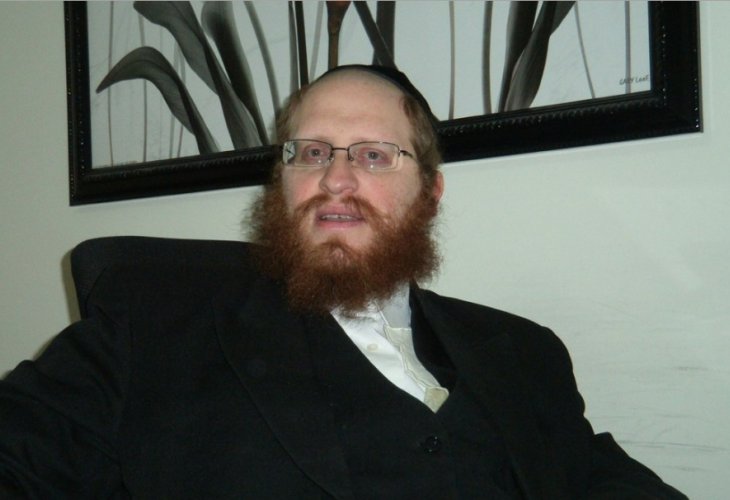Understanding ADHD in the Jewish Community: Perspectives and Solutions
Why early diagnosis of ADHD in children is crucial, what untreated ADHD symptoms look like in adults, and whether ADHD itself poses a risk for academic failure. Rabbi Aharon Lerner, a therapist specializing in coaching individuals with ADHD, has released an in-depth guide tailored for the observant community – addressing all these questions.
 Rabbi Aharon Lerner
Rabbi Aharon LernerRabbi Aharon Lerner will never forget the 21-year-old who came to see him a year ago. Lerner, an emotional therapist specializing in coaching individuals with ADHD, received a phone call from the young man's mother, who made the appointment for him. On the phone, she sounded like a Hasidic woman from an ultra-Orthodox community. But when her son knocked on the door, Lerner discovered a young man in jeans and a t-shirt, with an earring. Within minutes, it became clear that he was also seriously addicted to drugs.
"I quickly learned that he suffered from untreated ADHD, which led to his downward spiral. When I spoke to his parents again and tried to understand how a Haredi child from a good home ended up like this, they admitted they tried a variety of alternative treatments but never sought a professional diagnosis or provided the appropriate treatment for his challenges."
The pain of individuals like this young man and his family motivated Rabbi Aharon Lerner to write a monumental, 798-page book on ADHD, the most comprehensive guide of its kind aimed at the religious and Haredi public. Published by 'Hamodia' and sold in all Haredi bookstores, the book makes the topic accessible to every parent and educator in a thorough and professional manner. "I started writing out of a sense of mission. So many children and adults around us reach the edge of despair due to untreated ADHD, and we don't hear their cries for help."
 Cover of the book 'ADHD: Understanding and Succeeding'
Cover of the book 'ADHD: Understanding and Succeeding'What does an adult with undiagnosed ADHD look like?
"It's a person living with great pain. People come to me with high intelligence and special talents, suffering in every aspect of their lives. Sometimes they doubt their mental health because how else can they explain their behavior? Some develop depression and anxiety because of living in the shadow of untreated ADHD. Some say they're genuinely afraid of themselves—they don't know what reckless act they'll do next... They can't understand why they can't succeed in anything. They have abilities but feel shackled, unable to actualize them. In the religious community, a spiritual struggle often accompanies these feelings: They develop aversion to Torah study due to concentration issues plaguing them since childhood, while fearing punishment in the afterlife..."
Punishment in the afterlife? Because of ADHD?
"They don't know they have a disorder; they just know they're not right because that's what they've heard all their lives. Teachers and parents haven't always acted wisely, to say the least. I've had a young man with ADHD whose two older brothers were diligent. His Torah school teacher once told him when seeing how unfocused he was: 'You won't sit in paradise with your brothers...'"
He usually refers struggling adults to a psychiatrist specializing in ADHD. "At an older age, this is usually preferable to a neurologist. The psychiatrist can also diagnose additional issues developed over the years due to emotional baggage from ADHD issues—such as clinical depression." Once there's a diagnosis, relief follows. "Knowing what's wrong allows them to understand themselves and gather strength to cope, preventing negative self-assumptions. With a diagnosis, they can also learn about all available tools for people with ADHD to help them succeed."
And what happens with children? Rabbi Lerner says that although awareness of ADHD has significantly increased, parents still often struggle with the need to have their child diagnosed. "They see how smart and brilliant he is at home, how well he concentrates on books and games, and don't understand where the teacher sees a problem."
"They keep telling him: 'You can, you just don't want to..."
What do you tell such parents when they come to you?
"First, I explain what ADHD is. It's not that they're missing the 'attention' part; it's a lack of ability to manage attention. That's why this disorder is so confusing. Someone with a hearing impairment struggles to hear. Someone with a learning disability struggles to learn. But someone with ADHD can concentrate just fine on something engaging that captures their attention effortlessly. What they can't do is manage their attention to also focus on less interesting tasks. This confuses parents and educators and makes accepting the diagnosis difficult."
After explaining why it's likely the child has attention issues, he recommends a comprehensive examination by a developmental doctor (in early childhood) or a neurologist/psychiatrist (at an older age), along with a clinical assessment by a psychologist specializing in the field. "Even if the child shows clear signs of ADHD, a thorough examination and professional diagnosis are necessary. I wrote a whole chapter in my book about children who seem to have ADHD but actually suffer from completely different, non-neurological causes."
Why is diagnosing children with ADHD so important?
"We need to understand the experience of a child with ADHD. It's a child who's constantly told, 'You can, you just don't want to,' because he can focus beautifully on things that engage him, like comics, but can't listen for a minute in class. He wants to be good, because that's what every child wants. But he simply can't, and he feels all the blame for his failure is on him. When he's diagnosed, he understands himself and the door opens to help him."
 (Illustrative photo: shutterstock)
(Illustrative photo: shutterstock)Rabbi Lerner emphasizes that medications for ADHD are only part of ADHD treatment.
"The medication helps the child focus more and allows him to acquire learning tools, experience successes, and build a positive self-image. Often, after several years on medication, the child can stop taking it because improved self-esteem and practiced techniques while on medication help him manage without it. However, proper emotional support for the child is also crucial. These children need much more warmth and love—but also much more consistency in boundaries. Parents and schools need to give them the strength to deal with the reality of ADHD. Even if the problem is entirely neurological—without emotional support, neurological symptoms will worsen. And vice versa, of course."
"It's true that parents/educators of such a child need strength to cope (and I dedicated a special chapter on this in the book), but it's important to remember that the child also needs strength to cope: you're dealing with a child ADHD and he's dealing with the ADHD itself from which he can never take a break."
In addition to emotional aspects, Rabbi Lerner explains that other environmental circumstances also affect the manifestation of ADHD. "There's a well-known phenomenon where parents say: 'The medication worked until today and suddenly, this year, he's not focused again.' So I check and discover that last year he had a very engaging teacher—usually with ADHD themselves, because they are the most captivating teachers and lecturers—so a low medication dose was enough. This year he has a less engaging teacher and the low dose is no longer sufficient... Therefore, it's clear that an engaging teacher is the best recommended treatment for ADHD children."
Win with them, not over them
Rabbi Lerner says that when you learn to work with ADHD children rather than against them, you can go far. "And so the idea is to win with them, not win over them, which is the headline in the book's ad: 'Win them, lose them.'"
"Always remember what our goal is. For example, at the Shabbat table. If the father is constantly busy with 'sit and don't disrupt,' the battle is lost from the start. It's important to remember that the goal is not for the child to simply sit at the table but to love Shabbat, the meal, and the songs. How do you do it? By adapting the format to the children. I know a father to several ADHD children who dances with them at the table every Shabbat. There are families where the children get to lead activities, choose songs, thus keeping their focus. In another family I've visited, after the fish is served, they bring a game into the living room, and the children sit and play while singing. This way, children always feel that the Shabbat table is a positive and beloved experience, which is what we want to achieve."
In a chapter on the connection between ADHD and school dropout, Rabbi Lerner writes:
I once gave a person with attention difficulties a passage to read. Strangely, he couldn't read the words; he couldn't even look at the text in front of him. I was surprised and wondered what was troubling him; it wasn't an academic or scholarly text, just regular material... I tried different ways, and among other things, I went to the computer and changed the font. The font wasn't now prettier or more legible, but suddenly the man could read the text without a problem...
I was very puzzled and after investigating and trying to understand, the amazing answer was revealed; the first font he'd seen was the one he recognized from Talmudic studies; looking at the familiar script brought up all the challenging feelings he experienced with that text...
"It's an extreme case," he explains, "but this story illustrates the kind of attitude a child might develop due to unmet demands and lack of support. Every time a child experiences an emotional trauma related to learning or any spiritual matter, their internal pain creates a sense of aversion to the value. It's crucial to be aware of the future consequences of any injury and to invest effort to prevent such injuries! To achieve this, one can use the same energies currently wasted forcing the child to sit like everyone else at the Shabbat table and maintain the family's good name..."

